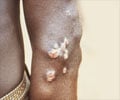Kato-Katz, the current method recommended by the World Health Organization loses its sensitivity to Schistosoma mansoni infections. A modified Helmintex method may serve as a more precise reference standard.

‘The study finds that Kato-Katz technique, the test recommended by the World Health Organization for detection of schistosomiasis (infection caused by parasitic worms carried by fresh water animals) loses its sensitivity and works better when paired with another method called Helmintex.’





Stefan Geiger, of Brazil's Federal University of Minas Gerais, and colleagues examined 254 individuals in a moderate prevalence area of Northern Minas Gerais, Brazil, using four different approaches to test for intestinal schistosomiasis. The approaches were: the standard Kato-Katz technique, which analyzes slides from up to three fecal samples; a modified Helmintex method, which isolates eggs from 30 g. of feces using magnetic beads; a saline gradient, which cleans 500 mg of feces to detect eggs; and a rapid urine test (POC-CCA) which detects a secreted protein produced mainly by adult worms of S. mansoni.When additional tests were used alongside the Kato-Katz method, the estimated prevalence of schistosomiasis in the population rose 2.3 times, from 20.4 percent to 45.9 percent. All methods lost their high sensitivity at low and very low-intensity infections. The sensitivity of the POC-CCA (64.9 percent) was similar to the sensitivity of analyzing six Kato-Katz slides from three fecal samples. The best sensitivity was obtained with the Helmintex method (84 percent).
"In its present form, Helmintex is not applicable for large-scale screening due to the required sample size and the time-consuming sieving and sedimentation processes, but might be an adequate reference standard or gold standard for the evaluation of newly developed, field-based diagnostic tests," the researchers say. "We believe that a combination of methods has to be implemented since the schistosomiasis control programs in different regions of the world are moving from morbidity control towards transmission control and elimination."
Source-Eurekalert









